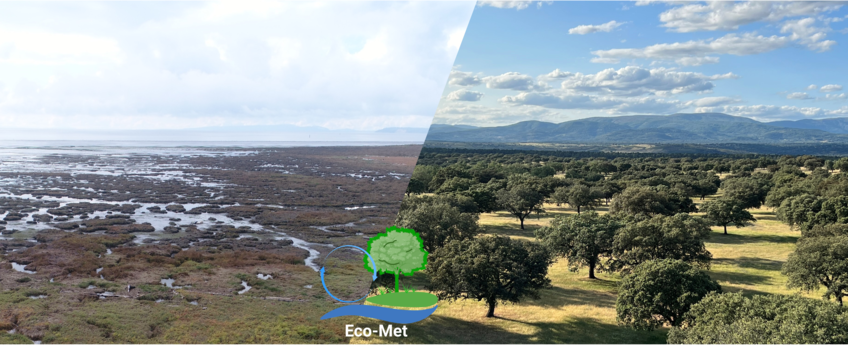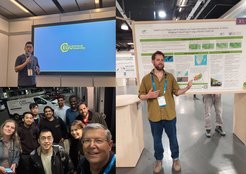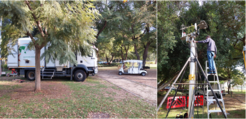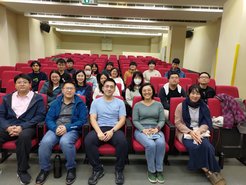
Eco-Meteorology group
Dr. Sung-Ching Lee
Mission
The Eco-Meteorology Group (Eco-Met) aims at improving the understanding of the interactions and feedbacks between climate, environmental changes, nutrient availability and the biogeochemical cycles of carbon, nitrogen, and phosphorus. To this end we combine tools and approaches from biometeorology and biogeochemistry such as eddy covariance flux observation, field manipulation experiments, soil and plant analysis, and proximal/remote sensing techniques. With a global focus, the group investigates the biosphere-atmosphere interactions by contributing to and analyzing globally distributed datasets (e.g. FLUXNET database, remote sensing products) using data-mining and model-data integration techniques. Exploiting this generalized information, our final goal is to enhance the description of the response of biosphere’s element cycling to climate variability in state-of-the-art global terrestrial biosphere models and up-scaling approaches.
Focus Areas
1. Semi-arid tree-grass ecosystem
Focus #1: Climatic and environmental controls on ecosystem-atmosphere energy and mass exchanges:
- Eddy covariance measurements of mass-energy exchanges between terrestrial ecosystems and the atmosphere at Majadas de Tiétar;
- Characterization and partitioning of water fluxes;
- Impacts of nutrient availability on carbon and water fluxes;
- Contribution to and analysis of large dataset (e.g. FLUXNET database);
Focus #2: Phenology and Ecosystem Processes
- Interactions and feedback between climate and land surface phenology;
- Understanding the relationship between phenology and water cycles;
- Development of tools for the measurements of land surface phenology;
Focus #3: Remote Sensing of Ecosystem Function
- Understanding the information about photosynthesis, ecosystem functioning and stress encoded into hyperspectral remote sensing observations and sun induced fluorescence (SIF);
- Evaluating factors affecting hyperspectral and SIF signals at different temporal scales;
- Evaluating drivers of the photosynthesis-SIF relationship in climate manipulation experiments;
2. Blue carbon ecosystem
Focus #1: Climatic and environmental controls on ecosystem-atmosphere energy and mass exchanges:
- Eddy covariance measurements of mass-energy exchanges (including methan fluxes) between terrestrial ecosystems and the atmosphere;
- Impacts of tidal actions on carbon and water fluxes;
- How vegetation ad microbe affect carbon and water fluxes, and how are they impacted by changes
- Contribution to and analysis of large dataset (e.g. FLUXNET database);
Focus #2: Dynamics and underlying mechanisms of lateral exchanges:
- Assessment of lateral carbon fluxes under different conditions using high-frequency measurement;
- Contribution of lateral exchanges in the net ecosystem carbon exchange;
- Understand composition of different sources of soil carbon storage (i.e., autochthonous and allochthonous inputs)
Focus #3: Modelling of flux and storage and estimates in a larger spatial scale
- Advancing process-based models for blue carbon dynamics;
- Combining machine learning techniques with process-based model;
- Using remote sensing products with best available model to provide robust regional/national/internation blue carbon budget
Recent News
April 2025
Last week (28.04 to 02.05), the Eco-Met team was busy at the EGU 2025, but it was a very fruitful week. Nick co-convened a session on tropical forests (BG3.11) and a townhall on blue carbon (TM25). Group members including Sinikka, Bayu, Arvind, and Dan had great presentations in different sessions. Using this nice opportunity, we had a nice joint dinner with Prof. Dr. Dan Yakir's team to discuss future synergies. In addition, we also had wonderful interactions with scientists from FLUXNET, ECOSENSE, China, India (Dr. Sachchida Tripathi), and Taiwan forming further collaborations.

March 2025
Dan Elhanati started his postdoc at the Weizmann Insitute in December 2024 under the Max Planck-Weizmann Joint Postdoctoral Program, co-supervised by Dan Yakir. He'll be operating themobile lab (figure below) in Africa (from South Africa to Kenya) during his first two years. Then he'll bring the data to work with modeller and remote sensing people for another two years at the Eco-Met group. In March 2025, he visited MPI-BGC to exchange ideas and initialize the connections.

December 2024
The Eco-Met group started two new projects ("Unveiling the impact of land cover change in Africa on the land-atmosphere interactions” and "Carbon sequestration in the Wadden Sea”) this month. A newly funded project from DAAD (German Academic Exchange Service) on carbon flux and soil carbon of agroecosystem will start soon, stay tune! Lastly, we wish everyone a healthy and relaxing holiday season, and see you in 2025.

May 2022
The group has a new group leader!
To continue and re-design the successful research group Biosphere-Atmosphere Interactions and Experimentation previously led by Dr. Mirco Migliavacca (currently at the European Commission's Joint Research Centre) and Dr. Tarek El-Madany, Dr. Sung-Ching Lee joined the group as a new group leader. The new group will continue running the existing research site at Majadas de Tiétar, a semi-arid tree-grass ecosystem, and hence better understand the relevant understudied and unknown processes for dryland ecosystems.
Besides this, the new group has great interest in establishing coastal wetland (“Blue Carbon”) research in Germany, particularly in the Wadden Sea area. Unlike upland ecosystems, the exchanges between coastal ecosystems and the atmosphere are not only controlled by bio-meteorological variables but regulated by unique features such as salinity, tidal movements, and wind advections.
To reflect the new directions, the name of the group has been changed from Biosphere-Atmosphere Interactions and Experimentation (BAIE) to Eco-Meteorology (Eco-Met).


